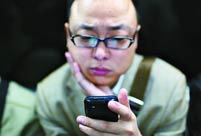BEIJING, Nov. 7 -- Wang Jun, who is studying for a master's degree in clinical medicine, is confused about his future career and will soon have to make major decisions about his life.
"I was depressed by the mounting prejudice against doctors and the deep distrust held by the public. I even began to doubt my decision to study medicine," the 25-year-old second year student said.
Wang, like many other medical graduates, is worried about pay, workload and the deteriorating working environment.
More than 600,000 medical school students have graduated each year over the past few years, but only 20 percent of them have become clinicians, said Li Ling, a professor in health economics of the National School of Development at Peking University.
"The phenomenon is not accidental and has been getting increasingly serious based on our survey across the country," Li said, adding that "educational resources have been wasted as a large amount of medical talent has flowed out of the industry."
Wang Jun said he will go abroad to get a job in a hospital after graduating from Shandong University next year.
"It's hard to give up what you've been working on for a few years," he said. "It's true that the overseas medical industry is very competitive, but the overall environment probably will make me feel better."
Li Ling attributes the outflow of medical talent to the worsening environment of the industry.
"Those who chose to become a doctor as their profession are somewhat idealistic with the aspiration of healing the wounded and rescuing the dying," Li said. "However, some of them gave up their medical career as they disagreed with the profit-oriented operation in hospitals."
Liu Yanhua, who became a doctor at the NO.89 Hospital of the People's Liberation Army two years ago, said only five out of the 55 medical graduates in her class became clinicians. The rest are either pursuing further education, in pharmaceutical sales or switched to other sectors.
Doctor-patient tension is another reason why the profession is less attractive.
The incidence rate of medical disputes in China has increased annually by 22.9 percent since 2002. Patient-doctor conflicts have escalated into violent or even fatal attacks.
Among the 34 attacks against doctors involving patients or their relatives that happened from February 2012 to September 2013, five doctors were killed, a microblogger in the medical circle wrote on his Sina Weibo account.
In addition, the heavy workload and relatively low income has also contributed to the outflow of medical practitioners.
"It's common to work around the clock when there are plenty of patients, moreover, mental stress is even heavier than physical fatigue," said Xiao Jinyi, who has been working in a Beijing hospital for four months.
However, the heavy workload has failed to bring doctors attractive salaries. Xiao said new staff like her earn no more than 5,000 yuan (821 U.S. dollars) each month.
"Doctors in our hospital have left because of intense pressure or bleak career development prospects," Xiao added.
The supply of medical graduates has outstripped demand thanks to China's college enrollment expansion drive since 1998, which has also led to the outflow of medical talent.
 Fire guts 22-storey Nigeria commercial building in Lagos
Fire guts 22-storey Nigeria commercial building in Lagos U.S. Navy Carrier Strike Group stages military exercises
U.S. Navy Carrier Strike Group stages military exercises Volkswagen showcases new energy vehicles in Beijing
Volkswagen showcases new energy vehicles in Beijing  How should we get married nowadays?
How should we get married nowadays?  Commentary:
Commentary: Jakie Chan sees Rubber Duck off in Beijing
Jakie Chan sees Rubber Duck off in Beijing Hello! Horror Halloween Celebration!
Hello! Horror Halloween Celebration!  The catwalk to the world of fashion
The catwalk to the world of fashion  Cruise trip to Taiwan
Cruise trip to Taiwan  Unveil PLA air force base
Unveil PLA air force base  Say goodbye to tube-like apartment building
Say goodbye to tube-like apartment building Oriental education or western education?
Oriental education or western education? China in autumn: Kingdom of red and golden
China in autumn: Kingdom of red and golden National Geographic Traveler Photo Contest
National Geographic Traveler Photo Contest Chinese screen goddesses from Beijing Film Academy
Chinese screen goddesses from Beijing Film Academy Day|Week|Month